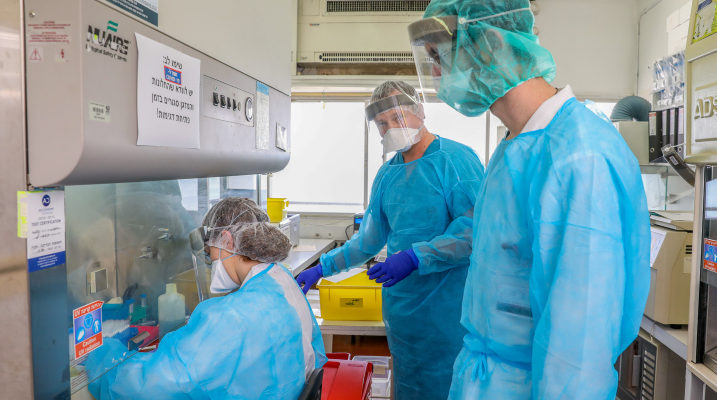Institute that isolated coronavirus antibodies says contracts have been signed with two companies to produce a treatment, but there is a long road ahead for testing and proof that it will work.
By Paul Shindman, World Israel News
Israel’s breakthrough discovery last week of coronavirus antibodies was great news, but the road to producing an effective vaccine that the world desperately needs is still long and full of obstacles.
News of a breakthrough by researchers at the Israel Institute for Biological Research who had isolated an antibody that attacks the virus gave hope that the end of the pandemic might be on the horizon.
The antibodies will be used to produce medicines to block COVID-19, and the institute has already filed a patent application and signed contracts with two major pharmaceutical companies to produce the drug, the Makor Rishon newspaper reported.
But experts caution not to expect anything soon, even though the World Health Organization reported last week that eight candidate vaccines are already in clinical evaluation and 100 other vaccines are in pre-clinical testing.
One scientist at the Israeli institute said the monoclonal antibody they isolated is indeed a positive discovery and a great success for the lab, but they still have big question marks about whether or not a drug made from the antibodies will work on humans.
Vaccine development at best takes up to two years, and at worst, like in the case of herpes, scientists are stymied and an effective vaccine remains elusive.
The Israeli researcher said the institute would be publishing their results shortly and that with the production contracts signed, there may be a cure for coronavirus in six to eight months, but that assumes everything will go smoothly.
With or without a feared second wave of infection, producing a vaccine requires trials and evaluations that take time, and there are few shortcuts on the path to a vaccination.
World Health Organization director Dr. Tedros Ghebreyesus pointed out the battle against the deadly smallpox virus took almost two centuries.
“Although a vaccine was crucial for ending smallpox, it was not enough on its own. After all, the vaccine was first developed by Edward Jenner in 1796. It took another 184 years for smallpox to be eradicated,” he tweeted.
When Israel’s Defense Ministry or President Donald Trump come out with headlines implying a cure is in the making, most news readers see the headline, not understanding the intricate complexities involved.
“We’ve never accelerated a vaccine in a year to 18 months,” Dr. Peter Hotez, dean of the National School of Tropical Medicine at Baylor College of Medicine in Houston, told CNN. “It doesn’t mean it’s impossible, but it will be quite a heroic achievement. We need plan A and a plan B.”
Trump’s top epidemiology advisor Dr. Anthony Fauci said a vaccine could happen in a year to 18 months, but other experts like England’s Chief Medical Officer Chris Whitty say a year may be too soon and people should expect a vaccine only by 2022.
The feat of developing a vaccine in such a short timeframe would be unique, but then there is the challenge of producing billions of doses for distribution around the world – a task never before attempted.
If no vaccine is possible, instead of defeating COVID-19 like the world eradicated smallpox, we may instead have to learn to live with it. That depressing outcome is rarely talked about by leaders, as most experts remain confident a vaccine will eventually be developed because the coronavirus does not mutate rapidly.
The earliest a coronavirus vaccine would be available is next spring because the first vaccines require months to be tested to see if the administration of the medicine is safe, then months more to to make sure it does indeed protect against infection.
Until then, keep your distance, keep your mask on and wash your hands.





